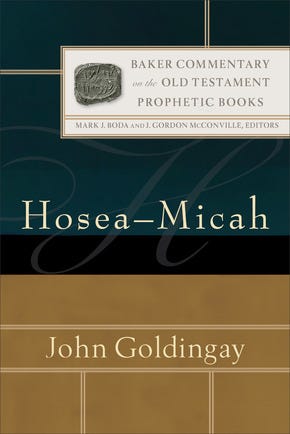John Goldingay on Hosea–Micah
John Goldingay
Hosea–Micah
Baker Commentary on the Old Testament Prophetic Books
Grand Rapids: Baker, 2021.
Reviewed by Andy Judd
Of the making of books, John Goldingay seems to have no end. This recent one is a 542-page commentary on the minor prophets, Hosea–Micah – that’s six prophets in one volume, including Hosea, Joel, Amos, Obadiah, Jonah and Micah.
Those familiar with Goldingay’s approach will find much to appreciate here. He side-steps many distracting critical issues in order to focus on what the final form of the Hebrew text is saying, and is admirably gun-shy when it comes to correcting the Masoretic scribes’ homework. While written from a Christian perspective, his natural reflex is to hear the theology of the First Testament rather than filter everything through NT theology. He recognises the intentional canonical placement of the Twelve but chooses to interpret each book individually. In dealing with the date of Jonah he points out that the story would make a lot of sense if told during the Second Temple period, but also acknowledges that imaginative short stories can be true in many different ways, and the linguistic arguments for the later date is ‘not strong and it would be unwise to base anything on it in isolation’ (p. 370).
This kind of wisdom is what we come to expect from one of our leading OT scholars. The writing is judicious in what it leaves out and shows the kind of confident clarity about what’s important that is hard-won over a long career of teaching and writing. The tone is warmly informal without being chatty, though a little more close editing of the prose would not have gone astray. At times I found myself re-reading sentences that could have been restructured to avoid ambiguous syntax and infelicitous style. Perhaps that is the cost of bringing out so many volumes so quickly.
The book begins with an introduction to the six prophetic books (or ’scrolls’ as Goldingay characteristically calls them) as a whole. This is largely an efficient way of covering common historical context and literary issues such as how prophetic speech relates to prophetic writing. There is little attempt to distill the themes or theology of the twelve (or six) as a whole, and the section on the scrolls in the New Testament provides not much more than a table of quotations from the RSV marginal notes and an explanation for his approach and its focus on the OT's theology.
Each giblet of text receives an overview then the translation with textual and translation comments in footnotes. It is mostly a judicious amount of information, though some of the translation decisions left me puzzled. I don’t know that ‘freedom for your teeth in all your towns’ (Amos 4:6) is particularly accurate or illuminating (‘cleanness' of teeth or, following the logic of the idiom, 'empty stomachs', would be the normal translation). While I appreciate the alliteration of ’the music of your mandolins’ in Amos 5:23 if you are going to contextualise using eighteenth-century stringed instruments you might as well go all the way and call it an electric guitar (unless as with the ‘perennial wadi’ in the next verse we are aiming for exotic). The choice to transliterate proper nouns throughout the translation leaves a page that is ugly and equally inhospitable to people who do know Hebrew as it is to people who don’t. Why is there not yet a law against transliteration? Mercifully, in the actual discussion of the text the transliterations often drop out and the normal names seem to do just fine.
The commentary continues then with an Interpretation and Theological Reflection. The Interpretation is solid, often drawing from Andersen and Freedman’s golden commentary or perhaps a choice Karl Barth quote. The theological reflection was helpful and informative if sometimes a little muted in its creative sizzle.
The ‘minor prophets’ seldom receive the attention they deserve, and so I am grateful for another quality Christian commentary on these six distinctive voices within the prophetic tradition of the First Testament.
Dr. Andy Judd is Lecturer in Old Testament at Ridley College, Melbourne, Australia.


